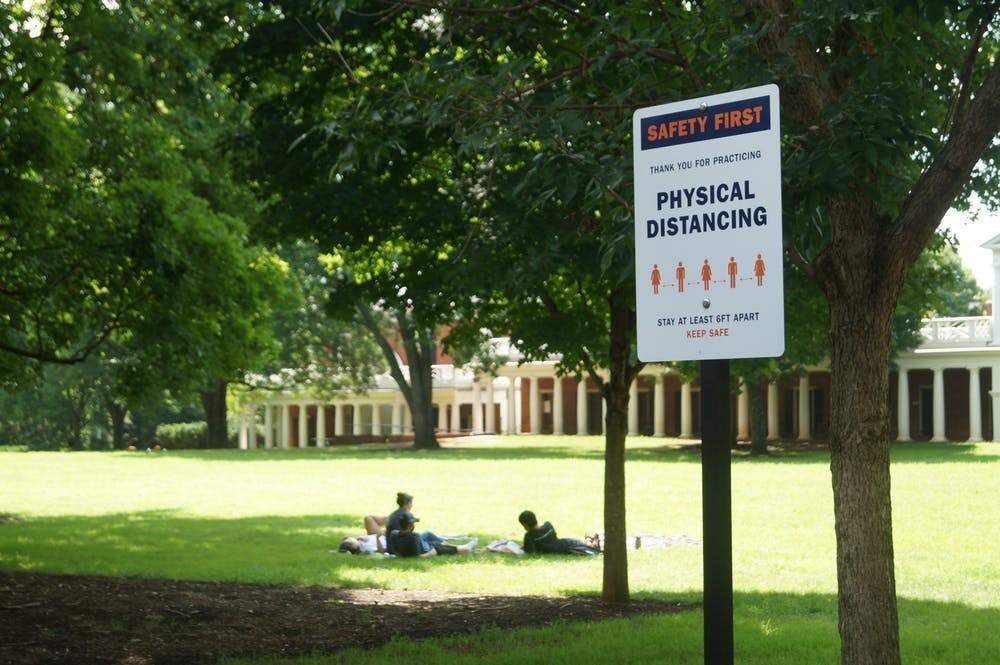1. Virtual Lighting of the Lawn
One of the most vibrant traditions in the winter season at the University, Lighting of the Lawn is an event that is cherished by all Hoos. This semester, students were not allowed to gather in groups of more than 15 people at any point — at times, they were ever limited to gatherings of five — which led the LOTL committee to create a virtual event for all to safely enjoy. Many University acapella and dance groups were able to perform in a socially distanced manner to continue the LOTL celebration. Although it wasn’t the same as previous years, the theme of “finding our light” served as lighthearted encouragement for all who tuned in.
2. U.Va. prevalence testing
Shortly into the semester, the University implemented testing protocols to help ensure students’ safety, including wastewater and dorm testing on Grounds and prevalence testing for off-Grounds students. The prevalence testing was newly implemented and allowed students to be randomly tested frequently to measure the prevalence of the virus in the Charlottesville area. If chosen for prevalence testing, students were assigned times to be tested, and the University expanded testing access before Thanksgiving, allowing walk-in hours to allow students to get a test before returning home.
3. Athletics
Although fan attendance at most athletic events was not feasible, athletic events were still continued throughout the fall semester. Athletes were able to practice and compete with some restrictions and cautionary measures, including mandated weekly testing. Fall sports were played across the country and even Scott Stadium and Klockner Stadium were able to see a few visiting teams. Only family and limited friends of the players were allowed for in-person spectating, but the Hoos were not without fans cheering them on from their computers or TVs. Even with shorter seasons, the fall sports athletes were all able to compete and bring a little light into students’ otherwise coronavirus-altered semester.
4. In-person classes
This semester, about 30 percent of University classes had an in-person component. Labs and small classes requiring in-person instruction were vital for many students and were one of the biggest factors for students to return to Grounds during this tumultuous time. The success that U.Va. had when it came to limiting the number of COVID-19 cases allowed these classes to continue right up until Thanksgiving break. Furthermore, University administrators have seen no evidence of COVID-19 transmission within classrooms, potentially allowing the University to expand in-person class options for the spring semester.
5. The presidential election
This was the first time many underclassmen were able to vote in a presidential election — or truly any election of this magnitude and controversy. University students used their voices, their education and their opinions to encourage their peers to exercise their right to vote. This election allowed for many social issues and debates to become prevalent in student discussions, which have in turn helped us to become more well-rounded in our social and political awareness.
6. Testing wastewater
Wastewater testing was a groundbreaking approach to identify early COVID-19 outbreaks, and it was an important step for controlling the virus and allowing students to remain on Grounds. U.Va. Health collected and pooled wastewater samples from dormitories over 24-hour periods as research has shown that COVID-19 can be detected in stool. Other implemented measures such as dorm-wide testing and student-designated quarantine dorms made it possible for all on-Grounds dormitories to avoid complete shutdown this fall.
7. Students remaining on Grounds
In large part because of diligent student and staff efforts, students were able to live on Grounds. These efforts included wearing masks and social distancing. Many other universities had to send their residential students home during the early days of the semester. However, U.Va. community members did their part to prevent the virus from reaching dangerous levels that would have required the evacuation of students living on Grounds.
8. Classes adapted to Zoom
It goes without saying that professors had one of the most strenuous jobs this semester. Many had to alter their teaching methods and adapt to long-term virtual learning. This required training in Zoom and other formats as well as adapting hands-on instruction to virtual alternatives. Finals were completely online, and classes wrapped up a few weeks early. While the start of the semester was undoubtedly rocky as both students and faculty adjusted to the new teaching format, professors stepped up and the semester online ended up being successful for most.
9. Ground-breaking research at the University hospital
The University hospital provided testing, resources and support for members of the U.Va. community along with communities throughout western Virginia. In addition to providing support for the University’s COVID-19 efforts, the hospital participated in extensive research and trials
for cures, treatments, and new ways of testing. Research from the University hospital assisted the country in treating and learning more about the virus.
10. Strengthened sense of community with neighbors
This semester was characterized by potential exposures to COVID-19, unprecedented learning formats and a very different college experience than past semesters. Students learned to rely on their neighbors, friends and family for the support they needed. For example, if students were quarantining off-Grounds, their peers stepped up to deliver groceries for them. In addition, students followed University guidelines to protect themselves and their friends, encouraging each other to do so as well.







